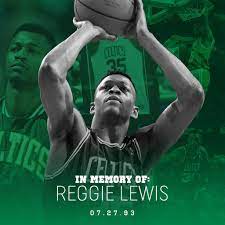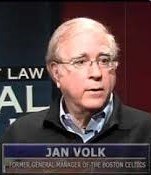There have been plenty of great basketball players whose lives were cut short far too early and 1 of the best ever was Reggie Lewis. At Dunbar High School alongside Muggsy Bogues/David Wingate/Reggie Williams he was part of the #1 team in the country in 1982. At Northeastern University he scored 2708 PTS and went to 4 straight NCAA tourneys. After being drafted by the Celtics he became an All-Star in 1992 and averaged 17.6 PPG during his 6-year pro career. HoopsHD’s Jon Teitel got to chat with former Celtics GM Jan Volk about drafting him and attending his final game. Today marks the 29th anniversary of Reggie’s death on July 27, 1993, so we take this time to honor his life/legacy.
Reggie was a 3-time conference POY at Northeastern and still holds the school record with 2708 career PTS: what was his secret for being a great scorer? He had extraordinary quickness and a very long 1st step. He was 6’7” but his legs/lower body were proportional to someone who was 6’9”. He took advantage of his speed/quickness and could get by just about anybody. He was an excellent shooter and was extremely athletic.
In 1986 he led the conference in almost every category imaginable (FGM/FGA/FTM/FTA/REB/STL/BLK/PTS): how hard is it to evaluate a player who is head-and-shoulders above everyone else in his mid-major conference, and how much importance did you place on the fact that he scored 132 PTS in 5 career NCAA tourney games? In that era it was not the norm for players to come out early: most of them used their full 4 years of eligibility. As a consequence, you got a chance to see the developmental curve from a player’s freshman year through his senior year. That provided a greater comfort level in our analysis, even though it is not an exact science. Regardless of who he played against in college, he was facing 4-year guys who were very experienced. It is always a plus to see how players react to pressure in March. Sometimes games in the regular season can take on the intensity of a tournament game but every single game in March is intense. Reggie was a counselor at Red Auerbach’s camp for a number of years before he was eligible for the draft so we were very familiar with his skill set. He primarily played forward in college rather than guard but we projected him as a 2-guard, which when combined with his combination of size and speed/quickness gave him a tremendous advantage over most other people who he was matched up against.
In the summer of 1987 he was drafted 22nd overall by Boston (4 spots behind Mark Jackson): why did you draft him, and did you think that he would become an All-Star? We were pretty comfortable that he was an NBA player. In evaluating his play the conference was relevant but it was less concerning to us because we had seen him at Red’s camp for a number of years. The leprechaun was looking out for us because Reggie sprained his ankle at one of the pre-draft camps and struggled in that environment but we were able to see through that. I first saw him play at Northeastern when he was a freshman and he stood out even back then.
His Boston teammate Larry Bird once said, “When Reggie first came into the league he really did not know how to play the game” because he was just a shooter: how did his all-around game develop during his time in Boston? The most significant obstacle was gaining the confidence of his teammates/coaches in an environment of very accomplished/experienced guys. Coach KC Jones would usually rely on veterans rather than throw rookies into the mix early on so Reggie did not get a lot of playing time during his 1st year…but he made the most of it when he did get onto the court. He was also changing positions from forward to guard. Team scouting departments are often asked to project where guys will fit into their team’s lineup and in this instance our scouts were spot-on. At the time we spoke in terms of small forwards, 2-guards, etc. Today the nomenclature is different: he would be a “wing” player along with several other wing teammates. He was a natural 2 but it took him a year to prove that to everyone. Those who had to guard him in practice, particularly Dennis Johnson, quickly recognized his innate talent and were very supportive of him.
He scored 4.5 PPG in 8.3 MPG as a rookie but then increased his scoring to 18.5 PPG in 32.8 MPG in his 2nd year: how was he able to improve so much in only 1 year? There was no “eureka” moment: he was a hard worker and he made the most of his opportunities. He knew why he was there.
He was also known for his charitable efforts: what was he like off the court? I know that he was very tied to both the Northeastern community and the African-American community in Roxbury and felt a strong sense of giving back, which he did without a lot of fanfare. His Thanksgiving turkey giveaways were legendary but he did not do it for the accolades. He was a very quiet guy, which was one of his distinguishing characteristics.
In Game 4 of the 1992 Eastern Conference 2nd round he had 42 PTS/6 AST/5 STL in a win over Cleveland while holding Craig Ehlo to 1 PT in 45 minutes: where does that rank among the best all-around games of his career? I do not remember that game specifically because he had so many good games, including a 1991 regular season game against Chicago where he blocked Michael Jordan 4 times, which sticks out a little more in my memory (www.youtube.com/watch?v=ni7t4swtdYw).
In Game 1 of the 1993 Eastern Conference 1st round he scored 17 PTS/7-11 FG in 13 minutes before collapsing during a win over Charlotte: what caused the incident, and did you think that he would ever play again? Those are tough questions because we were doing it in real-time without any hindsight. I did not see him actually fall because the ball was on the other side of the court from me. I turned to the backcourt, saw him on the ground out of the corner of my eye, and then watched him get up. I just assumed that he got tangled up or collided with another player but there was no replay in the arena for me to review. Like everyone else, I did not have the medical background to make a judgment but it had not occurred to me that he would never play again. We were scheduled to play Game 2 a couple of days later and on the day in between Games 1 and 2 he went to the hospital for a series of tests to see what was going on. Test after test had shown no serious problems so the inference was good. Toward the end of that day I got a message that he was on his way home, which sounded good, but after he left the hospital the doctors reviewed his last test and decided that they wanted to bring him back. He ended up missing Game 2, which we did not expect, and we lost a very close game (99-98 in double-OT). I saw him soon after at the hospital and he was in a playful mood. We were due to fly to Charlotte that night for Game 3 but early that afternoon I was told that a group of medical specialists with extraordinary international credentials were to confer about Reggie’s case (the “Dream Team”). Along with Celtics CEO Dave Gavitt, I attended that meeting at the New England Baptist Hospital. At the outset we made it clear to everyone that we were there to determine whatever was best for Reggie rather than what was best for the team. There was a lot of discussion at the hospital amongst these doctors about all of the different alternatives, but in the end it was the unanimous opinion of all in attendance that he needed an implanted defibrillator. At that point it sounded to me, as a layman, that he would never play again. We all agreed that it was a medical issue and that we should not be part of the group that informed Reggie about their conclusions. When we got to Charlotte we received a message from Reggie’s wife that they were heading to another hospital to meet with another cardiologist. That was the last contact we had with Reggie for about 10 days until Gavitt and I got a call from Reggie’s agent Peter Roisman to set up a meeting with his “new” doctors. These doctors said that the stress test had been misapplied by the “Dream Team” because it did not compensate for someone of Reggie’s height. They were unable to replicate the results and thought that he was just dehydrated. It was both good/scary news: I was a witness in a subsequent lawsuit against the “new” hospital and the last question they asked me on the stand was what I thought after getting that news. I said that I hoped to God they were right.
In July of 1993 he passed away at age 27 after suffering a sudden cardiac death during an off-season shoot-around: what was your reaction when you learned of his passing, and how disgusted were you to hear that his contract would be applied to Boston’s salary cap for 2 additional seasons because opposing teams refused to approve an exemption? Reggie’s passing was of course the worst possible scenario. When I got a call from a reporter that he had collapsed and died I was absolutely devastated. You are correct that there was a salary cap issue that arose, though in context the issue was petty and paled in comparison to the tragedy of his death. Simply stated, there was a provision in the salary cap (Collective Bargaining Agreement) for season-ending injuries where the injured player’s salary could be used for a replacement player, but there was no specific provision for replacement in the case of a player’s death. We brought the matter before the NBA Board of Governors seeking a ruling that this “long-term injury” provision applied in this case. We could not find a single Governor to even second our motion for an alternative provision, which they could have done had they wanted to.
When people look back on his career, how do you think that he should be remembered the most? Regrettably, we can only project his potential…but at that point he was just starting to be recognized as a top player in the league. When we played on the road I could tell who the other teams’ fans were afraid of, and I realized that Reggie had crossed that line. He was on his way: at the end of a close game teams would try to deny passes to Larry, and now Reggie was also starting to get that same kind of respect during crunch time. There is no telling how far he would have gone.


